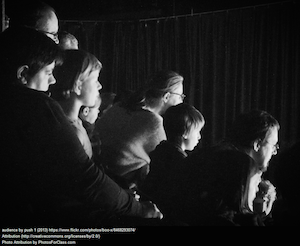5.4 Elements of Persuasion - Specific Audience
| Site: | Cowichan Valley School District - Moodle |
| Course: | ELA5, CSS, Sferrazza |
| Book: | 5.4 Elements of Persuasion - Specific Audience |
| Printed by: | Guest user |
| Date: | Monday, 15 December 2025, 2:37 PM |
Learning Targets
By the end of this lesson, you should be able to say YES to the following questions.
- Can you understand the elements of persuasive writing?
- Can you identify the importance of these elements in creating quality persuasive writing?

Specific Audience
 Another key element of persuasive writing is that it targets a specific audience. The audience is who you will be giving your message to. You would present information differently if you were talking to a room of preschool children versus a room full of middle school students.
Another key element of persuasive writing is that it targets a specific audience. The audience is who you will be giving your message to. You would present information differently if you were talking to a room of preschool children versus a room full of middle school students.
You would use simpler language and pictures for the preschool children. You would give examples that children could relate to. If your topic was reading makes you smarter, you could give examples of good books to read like The Very Hungry Caterpillar or The Zoo.
For the middle group, you could use more complex language and go into more details about your topic. You could give examples of good books to read like A Wrinkle in Time or the Harry Potter series.
 Complete the assignment Audience & Examples.
Complete the assignment Audience & Examples.
Relationship with Audience
Your relationship to the audience is also important.
You can use casual language if you are talking to a good friend or family member that is close to your age. Look at this email message below:
Hiya,
I totally need help with Math. Question #7 in Unit 2 is like a Rubik's cube. I have no clue what direction to go next. Help me! I'll treat you to a burger and fries. You're the best. Thx. M
When you are interacting or handing in work to teachers, you should be using formal language. You would not send the above as an email to a teacher. It's much too informal. You need to change your writing for your audience.
Mr. Amendt,
Could I please have help with question #7 in Unit 2? I am having difficulty working out the answer. Thank you for your help.
Mara
Formal vs. Informal Language
When we speak and write, we should be aware of how formal or informal we are.
To get a closer look at the difference, watch this video.
Formal vs. Informal
Formal language should be used with all adults, and informal language can be used with your peer group. Most academic work should also be written in formal English. This means using proper grammar, more complex sentence structure, and formal vocabulary.
When you address your teacher or other adults in public settings, you need to use Mr./Ms./Mrs. and their last name. You usually do not use their first names. When you address a peer, you can use their first name or their nickname.
In informal language, people use slang, shortened forms of words, and text talk. Do not use this in formal settings. See the chart below for some examples of the differences.
Casual - Formal
my bad - I am sorry.
way sucks - It's terrible.
dunno - I don't know.
yeah - yes
nah - no
cuz - because
thx - thanks
gotta - have to
LOL - That was very funny.
Formal Writing
Attributes of Formal Writing
- Does not use contractions (uses should not, cannot, did not)
- Does not use slang or text language (Slang is not tolerated in academic papers.)
- Uses complex and longer sentences (This celebration dinner is an elegant event.)
- Uses bigger and more complicated words (The selection of food is of the utmost quality and deliciousness.)
- Follows etiquette guidelines (Remembers to say please and thank you at all times.)
- Sounds very polite, can feel distant (I am very glad you could make it to our dinner tonight. Please enter the house.)
When To Use Formal Writing:
- At school
- At businesses
- In academic work
- With adults
 Complete the assignment, Make It Formal.
Complete the assignment, Make It Formal.
Informal Writing
Attributes of Informal Writing
- Uses contractions (can't, didn't, won't)
- Can use slang, text language (Wazup? LOL)
- Uses simple and shorter sentences (The party was fab.)
- Uses smaller and simpler words (Food was good.)
- Can sound disrespectful in the wrong setting (addressing your principal using her first name is a no-no)
- Sounds conversational and friendly (Super happy to see you! Come on in!)
When To Use Informal Writing:
- With friends
- With family members around your age
- With your peer group
- At the playground or park
- At home
Go to your Persuasive Writing Journal and complete Journal #5: Formal or Informal.